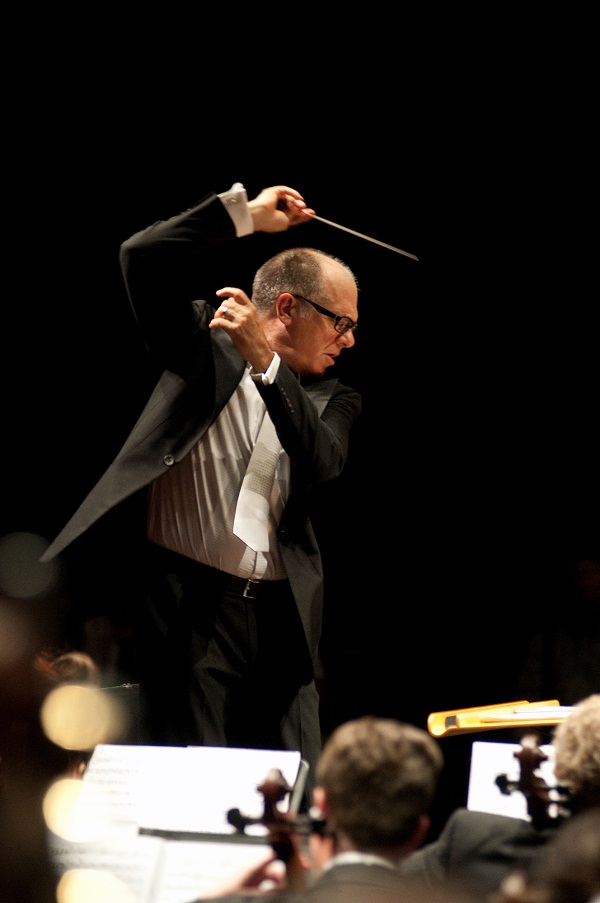La Jolla’s Magnificent Festival Performance of the Verdi Requiem
Has any composer been more successful depicting the medieval terror associated with the Day of Judgement than Guiseppe Verdi in the “Dies Irae” of his mighty Requiem? Yet no performance has ever tempted me to think that the actual Day of Judgement was about to occur until I heard the La Jolla Symphony and Chorus launch into the “Dies Irae” Sunday (March 19) afternoon in concert at UC San Diego’s Mandeville Auditorium.
On a shattering bass drum downbeat, conductor Steven Schick brought his full orchestra and 250-voice chorus in with a perfectly tuned cataclysmic scream of “Dies irae” (“Day of wrath”) that rattled the rafters and shook the floor. And when the brass choir followed with Verdi’s resounding, unearthly fanfare capped with its fusillade of apocalyptic trumpet calls—the “Tuba mirum”—I expected Gabriel himself to appear.Schick and his vast musical company offered a masterful performance that celebrated Verdi’s entire panoply of powerful emotions from awe to terror, from ethereal praise to abject supplication, using the most powerful operatic conventions to achieve a sublime state that eludes even the most lofty opera dramas. Large festival choirs easily impress by their sheer numbers, but this choral force stood out for its superbly cohesive ensembles and colorful but unified sonorities from each section.
For the Requiem, the La Jolla Symphony and Chorus was joined by the San Diego Master Chorale and the Chamber Chorale of the San Diego Men’s Chorus. From the rippling fugues that opened the “Sanctus” to the hushed but sumptuous choral halo that accompanied soprano soloist Ariana Strahl in the exquisite “Libera me,” the massed choir’s power and polish impressed at every turn.
Strahl’s radiant, opulent soprano provided the ideal proportion for this large-scaled production, yet with her commanding vocal power came the finesse of subtle phrasing and intimate gesture when the composer required such virtues. Victoria Vargas’s darker mezzo-soprano seemed quite substantial in her “Liber scriptus” solo with the chorus, but when paired with Strahl in the emotionally effusive “Recordare, Jesu pie,” it did not project her carrying power in the cavernous Mandeville room.
In the “Offerterio,” Verdi’s magnificent ensemble for the four vocal soloists at the very center of the Requiem, adding the soprano and mezzo to the bright edge of Robert Breault’s tenor and the sometimes covered tone of bass Colin Ramsey seemed to even out these discrepancies and fuse these four voices into into a rich, buoyant account of this impassioned prayer.
The La Jolla Symphony musicians acquitted themselves magnificently throughout the work, supple and responsive to Schick’s exquisitely detailed direction, displaying unity within sections that eludes other community orchestras. Their dramatic propulsion and stamina sustained both the terror and comfort of the “Dies Irae,” and I particularly recall their shapely, majestic climax to the “Offerterio.”
Kudos to Schick whose genial but demanding direction pulled these diverse forces together into such a confident and knowing performance. And it would be a serious oversight to fail to complement the choral directors who trained the singers in these three choruses: David Chase of the La Jolla Symphony Chorus, John Russell of the San Diego Master Chorale, and RC Haus of the San Diego Gay Men’s Chorus. Adding the 36 singers from the Chamber Chorale of the Men’s Chorus equalized the balance of the male and female voices in the festival chorus–both the Master Chorale and La Jolla Chorus have an imbalance of women in their ranks—with spectacular results. At last we experienced the solid choral foundation for all of those soaring sopranos!
Although this festival performance of Verdi’s Requiem was part of the La Jolla Symphony’s 2016-17 season, it was more than that. It served as a tribute and salute to the organization’s Choral Director David Chase, who is retiring in a few months at the end of the current academic year, capping 43 faithful and successful years of leading and developing the La Jolla Symphony Chorus. That two other major San Diego choral groups agreed to join the La Jolla Symphony and Chorus in this musical endeavor serves as a sign of the esteem in which Chase is held by his colleagues here in San Diego County.
[themify_box style=”shadow” ]Verdi’s Requiem was performed by the La Jolla Symphony and Chorus at UC San Diego’s Mandeville Auditorium March 17-19, 2017. The Sunday, March 19, performance was attended for review. The next La Jolla Symphony and Chorus concerts, with guest conductor Michael Gerdes, will be given May 6 & 7, 2017, in the same venue.[/themify_box]


I agree wholeheartedly with you. I thought it was a triumph in the truest sense…a synergistically amplified success! All the forces came together at their peak of will, skill, and commitment. I’ll never forget it.